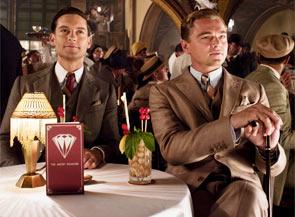 | « Back to article | Print this article |
 The Great Gatsby is a good looking film but is less heartfelt, writes Raja Sen.
The Great Gatsby is a good looking film but is less heartfelt, writes Raja Sen.
A famous Hindi film actor (who shall naturally go nameless here) once told me, while gushing about Baz Luhrmann’s work and cinematic flair, that he “is like Sanjay Leela Bhansali, gone right.”
I laughed it off at the time, but there are few more astutely drawn parallels than between these gentlemen who insist on creating opera but staging it a la cabaret.
Alas, it is with this new adaptation of The Great Gatsby -- in which Luhrmann indeed borrows an actor Bhansali has used before -- that the Australian director is tragically at his least heartfelt as he looks to smother F Scott Fitzgerald’s literary masterwork with tinsel butterflies. In 3D, no less.
Which isn’t to say it doesn’t look good. It is a massive piece of confectionary with Disney castles and gleaming yellow automobiles and flapper dresses and pink suits and champagne magnums filled with confetti, and Luhrmann shows off his world with brashly hallucinatory glee.
A visual where the most beautiful shirts in the world are flung towards us like exotic birds is particularly gorgeous, for example. And this Gatsby is set in the 1920s but -- despite the occasional and unintentionally hilarious swell of Gershwin (watch for the moment we first see the ‘hero’) -- booms along with a cleverly used but highly modern, Jay Z-filled soundtrack; even the Charleston challenges the subwoofer.
That might well have been the Jazz Age but this is unmistakably the Baz Age.
And yet it all comes across as a pale Moulin Rouge imitation, as if that eye-poppingly original director was being reined in, perhaps by the very source material many have called unfilmable. The result is trite, a mess of restless marionettes -- characters made wooden and visibly dying to burst into song but never allowed to -- peopled by very fine actors forced to ham it up.
Tobey Maguire’s Nick Carraway, for instance, talks of his cousin Daisy with the same saccharine awe he used as a 17-year-old in love with redheaded Mary Jane Watson. Which wouldn’t have been as problematic were he not this film’s narrator.
Ah, but far stranger things are afoot than merely contrived attempts at sincerity. In this film Carraway plays not just Gatsby’s friend but, inexplicably some sort of loony stand-in for Fitzgerald himself: Luhrmann’s whole film is a flashback from a sanatorium told in Maguire’s voice but heavy-handedly using Fitzgerald’s prose as if the character had come up with it.
What this B-movie framing device adds to the narrative itself is unclear, save for giving the director opportunities to write words like ‘grotesque’
